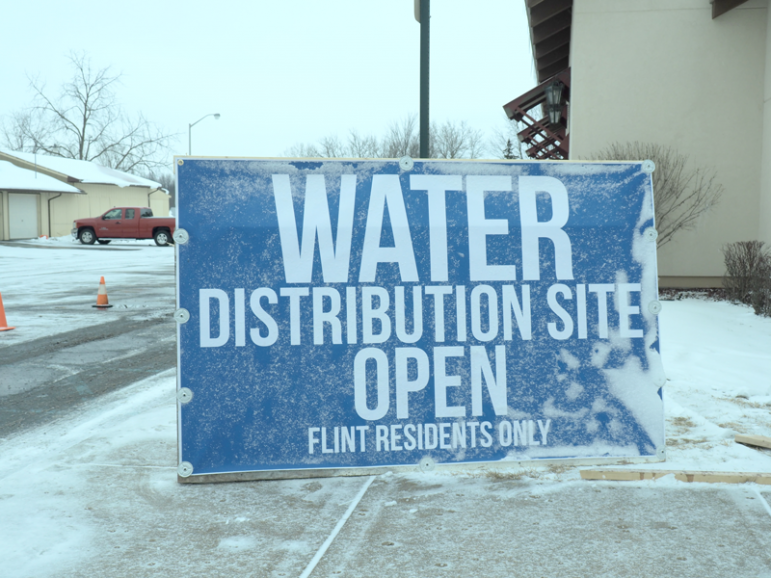
The sign for water outside Our Lady of Guadalupe Church in Flint. Image: Amanda Proscia
Commentary
By Eric Freedman
Gov. Rick Snyder remains under heavy fire for the amount of time it took for him to become publicly concerned with Flint’s escalating unsafe water crisis and to act decisively on those concerns.
But the governor is certainly making up for lost time —if you measure concern by the number of press releases flooding from his office.
That deluge of pronouncements, announcements, advisories and denouncements reflects a misperception that better PR is — if not a solution to the poisoning of a city, at least a priority deflection of too-slow-to-act criticisms and of the unfavorable and unwelcome international media attention the crisis continues to draw.
By my rough tally, for example, his office issued 11 press releases and advisories between Feb. 16-26 alone. Feb. 18 was an especially productive day with three: a comment on U.S. Health and Human Services Secretary Sylvia Burwell’s visit to Flint, a comment on the Legislature’s $30 million appropriation to help residents pay their water bills and the announcement of another $2 million to replace water infrastructure.
The administration’s Joint Information Center has been prolific as well with ten releases by my tally between Feb. 12-25.
[Of course, the Executive Branch’s PR pipeline isn’t the only one flowing to newsrooms. We hear — often frequently — from the Sanders and Clinton campaigns, Natural Resources Defense Council, Michigan Democratic Party, Democratic National Committee and legislators, especially and understandably Senate Democratic Leader Jim Ananich, who represents Flint. Among others.]
In another reflection of the governor’s bad-PR-is-our-problem mindset, Snyder threw his communications director Meegan Holland and press secretary Dave Murray — under the bus — under the bland press release description of “changes in communication office.” Both Holland and Murray had assumed their positions well after the crisis erupted.
In fact, Snyder’s public expressions of concern and activism about health and safety have become so urgent that he’s using his august office to warn the public to be careful about winter conditions.
“Gov. Rick Snyder urges caution for homeowners, businesses, motorists during severe winter weather,” one recent press release headlined.
Restating the obvious to voters who already know a lot about bad weather, Snyder “urged residents across Michigan to prepare for the forecast of severe winter weather conditions.”
“The heavy snowfall across much of Lower Michigan presents hazardous situations that demand caution and preparedness,” Snyder astutely observed. “I encourage all Michiganders to stay informed of the changing weather conditions and put safety first, especially while driving and heating their homes.”
More gubernatorial advice: “Make arrangements for incoming severe weather, including having an emergency preparedness kit stored in your home that includes: water, non-perishable food, a first aid kit, extra batteries, a battery or hand-crank powered radio, emergency lighting, flashlights, extra blankets and warm clothing.” And yeah, be careful of carbon monoxide poisoning.
OK, Governor, it’s one thing to order state agencies to do something —shut offices early, “proactively make weather-related information and safety tips available and be prepared to act as they continue monitoring the storm,” as you did.
But come on — this is Michigan, a state well-experienced in dealing with snow. “Be prepared” is in our bloodstream and our psyche.
On the other hand, he did manage to slip his concern about the Flint situation into his weather report with the same press release reassuringly saying, “All Flint Water Resource Sites will remain open during regularly scheduled hours of operation, 9 a.m. to 9 p.m.”
Eric Freedman is the director of Michigan State University’s Knight Center for Environmental Journalism which publishes Great Lakes Echo. This commentary originally appeared in Domemagazine.com
Where were the safety advisories the past two winters, when we really needed them? Ah, perhaps the Flint disaster had not become front page news during those frigid Februarys of 2014 and 2015. Well done, Eric.
What did Michigan State’s Knight Center for Envrionemtnal Journalism do for the people of Flint from the time the crisis started? What did any Michigan university do? Why did it take someone from Virginia Tech??